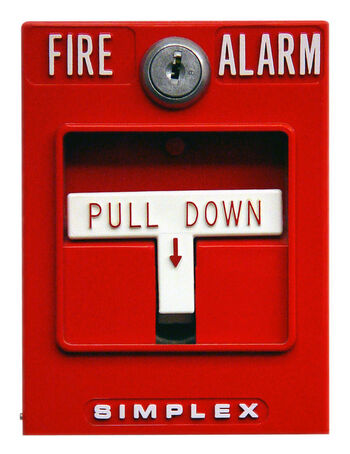No edit summary Tags: Visual edit apiedit |
No edit summary Tags: Visual edit apiedit |
||
| Line 9: | Line 9: | ||
If a schoolchild is suffering igniterroremophobia, teachers should notify parents about that behavioral problem. Then teachers and parents would help the child try to combat the fear by telling the sufferer that fire alarms are important safety tools, and that a fire drill is an educational skill about evacuating from the building in case of a real fire. Have a child do a fake fire drill at home, and then a parent should test the smoke alarms with the child until that child does not get scared. If these conductions go well, then the child would be less afraid of fire alarms at school. If that test doesn't work, then the sufferer should consider professional therapy. |
If a schoolchild is suffering igniterroremophobia, teachers should notify parents about that behavioral problem. Then teachers and parents would help the child try to combat the fear by telling the sufferer that fire alarms are important safety tools, and that a fire drill is an educational skill about evacuating from the building in case of a real fire. Have a child do a fake fire drill at home, and then a parent should test the smoke alarms with the child until that child does not get scared. If these conductions go well, then the child would be less afraid of fire alarms at school. If that test doesn't work, then the sufferer should consider professional therapy. |
||
| − | In addition to fire alarms, the sufferer may also fear sudden loud noises, such as tornado sirens, loud voices, balloons popping, or TV speakers. This is called [http://psychology.wikia.com/wiki/Ligyrophobia ligyrophobia]. |
+ | In addition to fire alarms, the sufferer may also fear sudden loud noises, such as tornado sirens, loud voices, balloons popping, basketball scoreboard buzzers or TV speakers. This is called [http://psychology.wikia.com/wiki/Ligyrophobia ligyrophobia]. |
If the fear materializes by maturity, sufferers may potentially begin to avoid going to any indoor public places, not just school, such as stores and movie theaters, where fire alarms or other loud noises are present. So due to the effect of this phobia, igniterroremophobia may eventually lead to [[agoraphobia]], or fear of leaving home, unless if the sufferer also [[fumusterroremophobia|fears smoke alarms]]. |
If the fear materializes by maturity, sufferers may potentially begin to avoid going to any indoor public places, not just school, such as stores and movie theaters, where fire alarms or other loud noises are present. So due to the effect of this phobia, igniterroremophobia may eventually lead to [[agoraphobia]], or fear of leaving home, unless if the sufferer also [[fumusterroremophobia|fears smoke alarms]]. |
||
Revision as of 18:10, 26 August 2017
← Back to: List of phobias

Igniterroremophobia (from Latin igni terroremo meaning "fire alarm" and Greek phobos meaning "fear") is the fear of fire alarms. This phobia is usually experienced by schoolchildren, who are afraid of the fire alarms suddenly going off while in school.
People suffering from igniterroremophobia would usually try to avoid going to school, but they know they have to. Schoolgoers would cover their ears while in classrooms, but that would cause lack of attention to teachers. Kids would be temporarily relieved of the fear when being outside, either for recess or for gym. Some schoolchildren may prefer to do homeschooling to eliminate all odds of hearing the fire alarm go off.
If a schoolkid suffering from the phobia hears from teachers or announcers that there will be a fire drill, then the schoolkid would want to run outside before the fire alarm goes off, and if the fire alarm goes off, he/she would panic, scream, and cover their ears while fleeing to outside.
If a schoolchild is suffering igniterroremophobia, teachers should notify parents about that behavioral problem. Then teachers and parents would help the child try to combat the fear by telling the sufferer that fire alarms are important safety tools, and that a fire drill is an educational skill about evacuating from the building in case of a real fire. Have a child do a fake fire drill at home, and then a parent should test the smoke alarms with the child until that child does not get scared. If these conductions go well, then the child would be less afraid of fire alarms at school. If that test doesn't work, then the sufferer should consider professional therapy.
In addition to fire alarms, the sufferer may also fear sudden loud noises, such as tornado sirens, loud voices, balloons popping, basketball scoreboard buzzers or TV speakers. This is called ligyrophobia.
If the fear materializes by maturity, sufferers may potentially begin to avoid going to any indoor public places, not just school, such as stores and movie theaters, where fire alarms or other loud noises are present. So due to the effect of this phobia, igniterroremophobia may eventually lead to agoraphobia, or fear of leaving home, unless if the sufferer also fears smoke alarms.